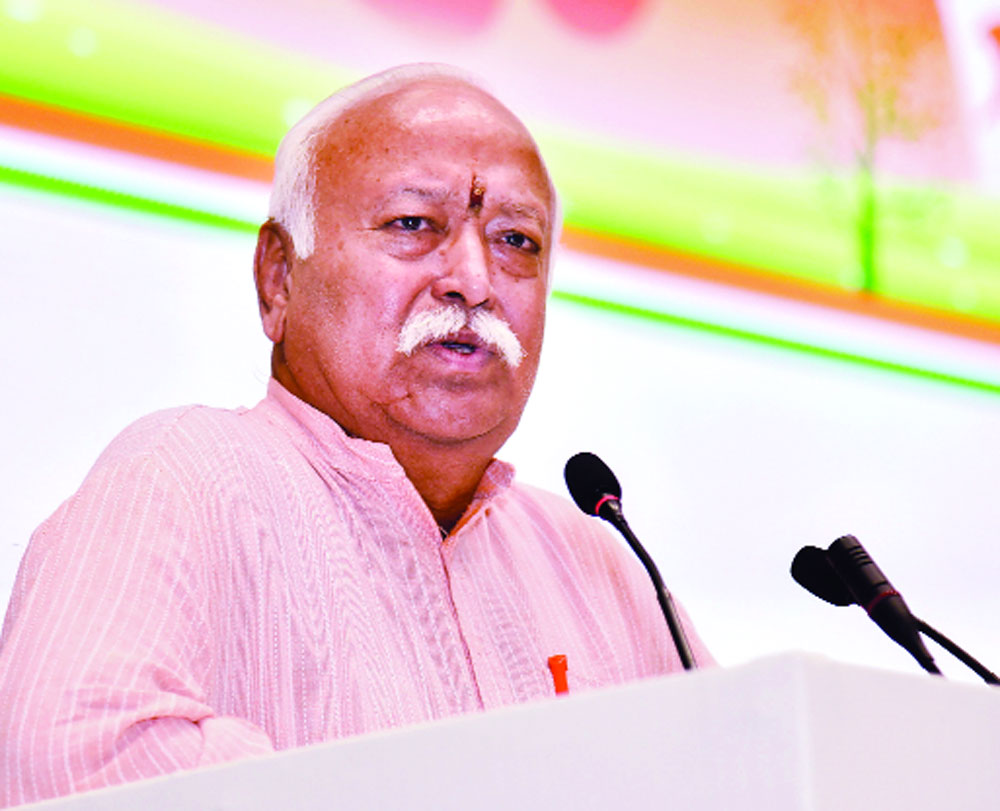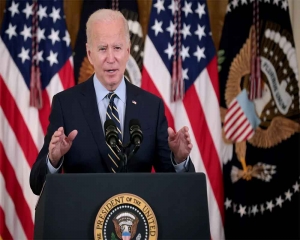The Nehruvians and Marxists, who have viewed the RSS with utmost suspicion, must pick up the gauntlet and see the RSS with fresh lenses to make an assessment of what this organisation is all about
The Rashtriya Swayamsevak Sangh’s (RSS) unprecedented outreach effort via well-planned and executed lecture series by its Sarsanghchalak, Mohan Bhagwat, before an invited cosmopolitan audience in the Capital should dispel much of the apprehensions that have been voiced about this organisation for many decades.
Having attended this event and heard Bhagwat as he touched upon a wide range of issues and chose to take the RSS’ opponents head on, I would say that his thoughts on core issues that are central to our democratic existence, like secularism, pluralism, diversity, rights of religious minorities, gay rights, the central ideas in our Constitution, the National Flag and the National Anthem, would have left most of the Sangh’s detractors speechless. Much of what has been said to condemn the RSS and to debunk the genuinely secular aspirations of the majority of citizens, was, to use a cricketing phrase, smacked out of the boundary and the stadium by the RSS chief.
While these assertions constitute the most significant outcome of this lecture series, what Bhagwat had to say about Guru Golwalkar’s Bunch of Thoughts, clearly points to the Sangh’s harmony with India’s democracy, diversity and liberal values. Although Guru Golwalkar, the second Sarsanghchalak of the RSS, saw Muslims, Christians and Communists as internal enemies, Bhagwat signaled that the RSS had decidedly chosen to move away from Golwalkar’s postulates. He said some things are said in a certain context. The RSS had now come out with a publication that had Golwalkar’s thoughts which were relevant at all times (Sadaa kaal ke liye upyukt vichaar) — this means that Golwalkar’s views on minorities, which are in conflict with India’s contemporary reality, have been edited out. Bhagwat said the RSS is not hidebound and that, as ordained by its founder, Dr Hedgewar, it had a duty to adapt itself to the changing times.
Here is a quick run down on the key issues he touched upon.
On the Constitution: Bhagwat spoke of the RSS’ unequivocal acceptance of and adherence to the Constitution of India. The Constitution represents national consensus. It is the duty of every citizen to respect and follow the Constitution. It had been drafted by persons of great calibre who took into account a variety of factors specific to Bharat. Everything was thought-through and every word was weighed before its incorporation and this includes the Directive Principles of State Policy and the Fundamental Rights. “It is our consensus. We believe we must all be bound by it.”
Talking about the Preamble, he specifically mentioned the reference to fraternity, dignity of the individual and the unity and integrity of the nation. Fraternity encapsulated the idea of Vividhata Mein Ekta (Unity in Diversity). The thought of taking everyone along, which is embedded in the Constitution, makes it a liberal document espousing universal values. That is what Hindutva is about. The RSS supremo’s categorical remarks regarding the efficacy of the Constitution should silence those who believe that the Sangh is anti-Constitution.
On diversity: One of the oft-repeated accusations against the Sangh Parivar is that it is a Hindu communal organisation and that it abhors diversity. Bhagwat’s well-articulated position on this issue is probably the RSS’ first serious effort at the national level to challenge its accusers. He told his audience that diversity is a matter of celebration. One should not fear diversity. On the other hand, we must celebrate and respect diversity. This is what Hindutva is all about. “My welfare depends on the welfare of all, this is Hindutva.” For the RSS, no one is an outsider (paraay). The effort is to unite everybody (Sampoorn samaj ko jodna hai). We must work towards a society that is devoid of divisions (bhed rahit samaj).
On the fear among Muslims vis-à-vis the RSS: Bhagwat invited Muslims to come to RSS programmes and institutions, and see the RSS from inside and get a first-hand feel of what the organisation stands for. A memorable quote from the lecture series was that Hindutva does not mean there is no place for Muslims. “The day it is said so, it will not be Hindutva any more.”
On mob lynching: Mob lynching and such other acts of violence in the name of cow protection is an offence and is unacceptable. At the same time, one must also raise one’s voice in regard to cow smuggling because the Constitution accords cow protection.
On gay rights: They (LGBTQ community) are a part of society. They should not feel isolated.
On the Uniform Civil Code: Bhagwat said that the RSS believed in ‘one nation, one law’. But at the same time, one must be aware of how diverse society is. Even among Hindus, there is so much diversity in these matters. Therefore, it is essential to ensure that there is no conflict on this issue.
On building the Ram Temple in Ayodhya: A grand temple must be built at that site. Lord Ram represents Bharatiya maryada. He was even called the Imam-e-Hind. There was a temple at that site before. It is a matter of faith for crores of people. The matter should not have dragged on so long. The temple should be built and when it comes up, “a big reason for tension between Hindus and Muslims will end.”
On reservations: The RSS supports all Constitutional provisions relating to reservations. Those who derive benefit from reservations must take a call on the continuance or otherwise of the policy of reservations. There is no problem in regard to reservations. The problem lies in the politics around reservation. Further, the law to protect Scheduled Castes and Scheduled Tribes must be strictly enforced. It must also be ensured that the law is not misused.
As can be seen from these responses, except for the Ayodhya issue, much of what he said should be acceptable to individuals across the political spectrum. Interestingly, he told the packed hall that he was not there to either convert or convince anyone about the core ideals of the RSS. He was there only to convey and extend an open invitation to whoever was interested to visit the Sangh and its Shakhas, and make their own assessment of what went on there. This is indeed the moment of truth. The Nehruvians and Marxists, who have viewed the RSS with utmost suspicion, must pick up the gauntlet and see the RSS from within and make their own assessment of what this organisation is all about. In other words, they too need to revisit their bunch of thoughts.
(The writer is Chairman, Prasar Bharati)


























